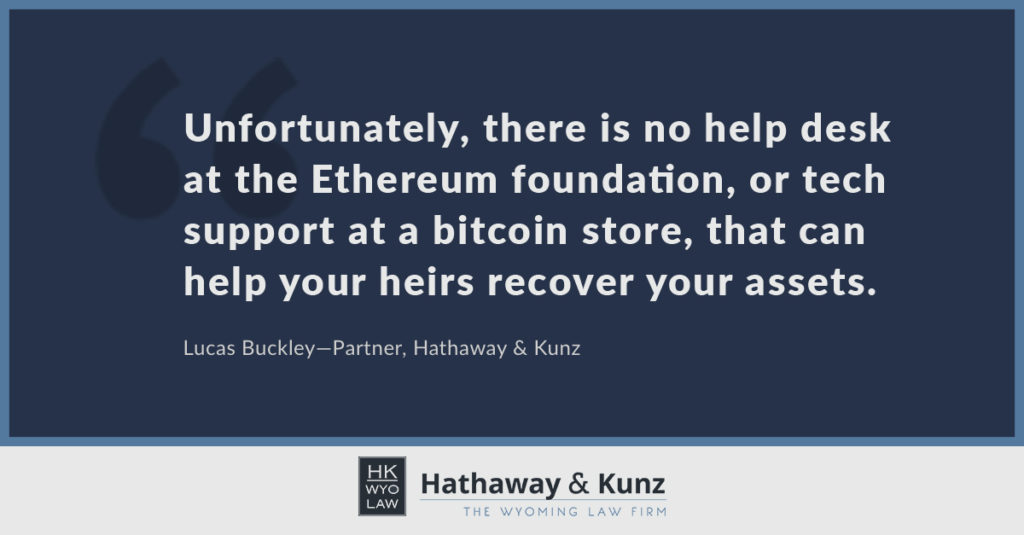Why you need a digital asset custody plan
Digital asset custody is a key consideration in digital asset wealth preservation, estate planning, and security.
With tangible assets—for example, a gold bar—you’re able to place them in a safe, or entrust their safekeeping to a trusted fiduciary.
With a digital asset there is, by definition, no tangible asset you can lock away to protect it from loss or theft.
In fact, the only thing that proves you own a particular amount of digital assets, NFTs, or any other store of value reflected on a public blockchain, is a “private key.” This private key is a random set of alphanumeric characters you can use to prove your ownership and conduct transactions with your digital assets on a blockchain.
What are the benefits of a private key for digital assets?
Using your private key, you can absolutely and categorically prove you’re the owner of your digital assets; you can even do so pseudonymously.
Moreover, you can prove your ownership with your digital assets in plain view, for anyone to see, because they are encoded in the public blockchain ledger.
How do you protect your private key information?
In theory, the surest way to guard your digital assets from loss or theft is to hold on to your private keys and never disclose them to another living being.
Most security experts would likely tell you that you should never even allow your private keys to exist in a digital form, such as a picture or in a locally stored computer file.
The downside is that your private key is the only way to prove your digital asset ownership. Since the early days of blockchain technology, a common mantra has been “not your keys, not your coins.”
But if you’re the only person with access to your private key information… what does that mean for your digital assets after you pass away?
What happens to digital assets after you die?
If you own significant digital assets, and you’re the only one with access to their private key, your wealth is lost after your death.

Who needs a plan for digital asset custody?
Here at Hathaway & Kunz, we generally advise that anyone holding significant wealth in digital assets needs to consider inheritance, tax, and wealth preservation issues as soon as possible.
If you’re an investor in and/or holder of digital assets, you need to formulate a plan for digital asset custody and transfer upon your death or incapacity.
Even if you’re not currently considering your estate planning, you can still evaluate options to protect your digital assets from creditors through asset protection trusts.
How to set up a digital asset custody plan in Wyoming
As our client, Hathaway & Kunz will work with you to create digital asset custody plans and relationships where:
- Third parties may custody your digital assets through their own private keys
- Third parties may assist in your digital asset safekeeping, without you losing control of the assets, through multi-signature wallets or other arrangements
Having a plan in place ensures that your wealth will not be lost if you pass away or become incapacitated, and your private key information will remain secure.
What’s the most important thing people need to know about digital asset custody?
As mentioned, we generally advise our clients with significant wealth in digital assets to consider inheritance, tax, and wealth preservation issues as soon as possible.
If you wait to look into digital asset custody until it’s too late, you won’t have a fallback option, such as enlisting the courts in probate proceedings. Lost keys result in digital assets being lost forever without recourse.
Here at Hathaway & Kunz, we have numerous affiliations and relationships with digital asset custody providers that can meet most any needs and circumstances.
The key is to establish a legally enforceable plan and cement those relationships early so that unforeseen circumstances do not irrevocably destroy the significant wealth being accumulated in the digital asset space.
To get started on your digital asset custody plan, click or give us a call to get started.